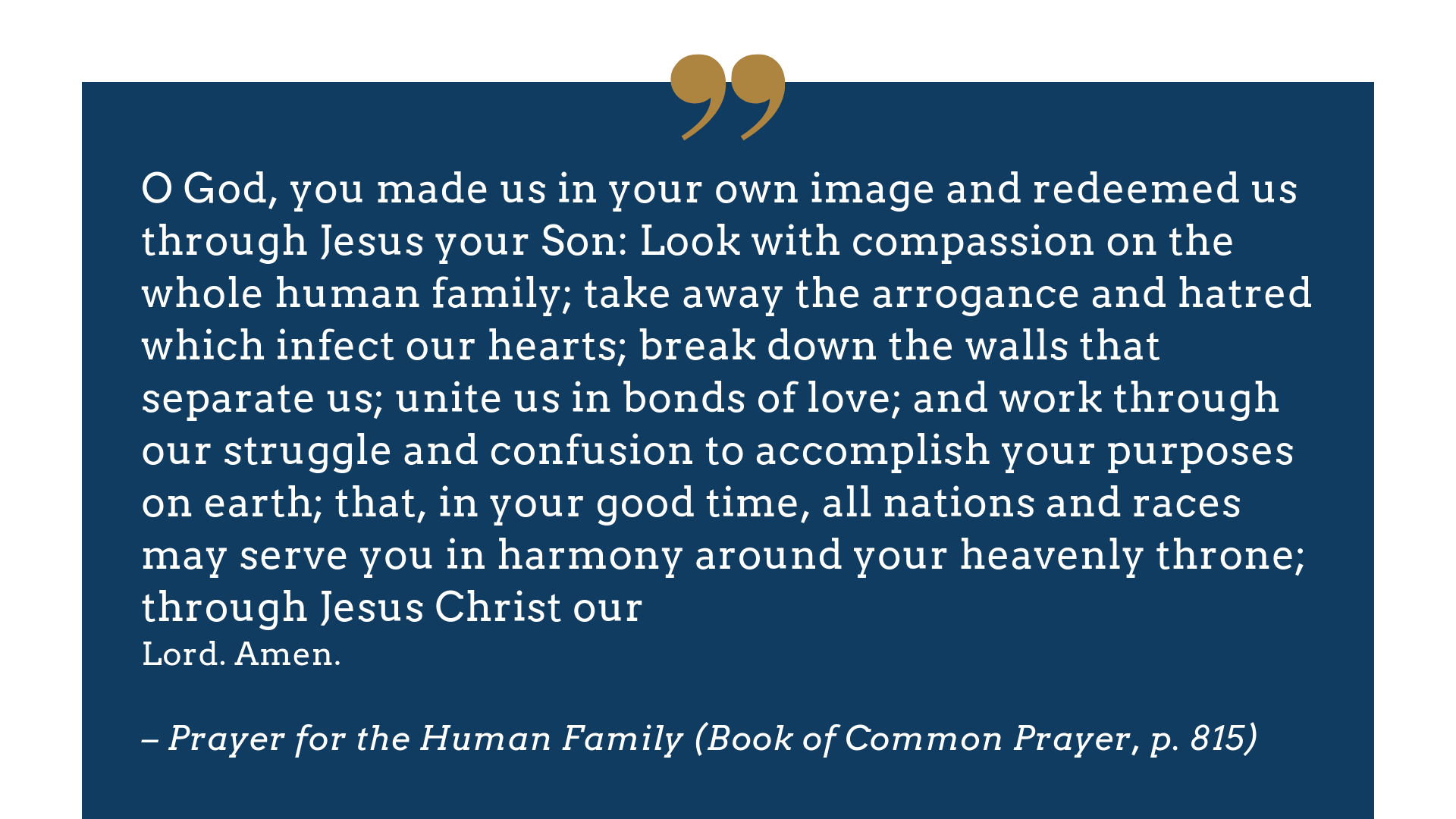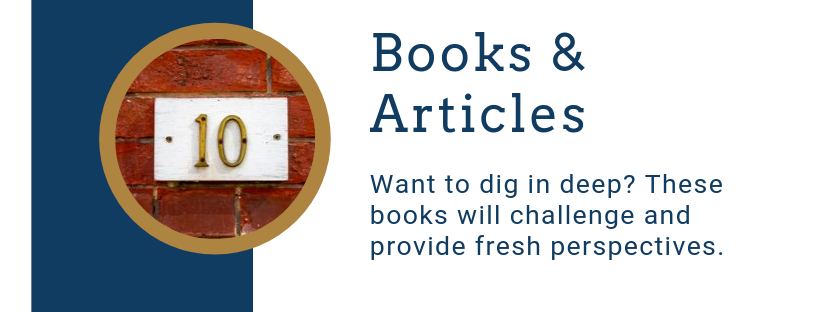Becoming Beloved Community
Becoming Beloved Community represents not so much a set of programs as a journey, a set of interrelated commitments around which Episcopalians may organize our many efforts to respond to racial injustice and grow a community of reconcilers, justice-makers, and healers. The labyrinth may be an even more useful image for engaging the vision. On the road toward reconciliation and healing, we move around corners and double back into quadrants we have visited before, each time discovering new revelation and challenge.
Presiding Bishop Michael Curry offers a message on the church’s work for racial healing
Join us on a journey to build Beloved Community at the Cathedral.
Through prayer and conversation, we have discerned the first steps for this journey at the Cathedral. Our desire is to provide formation experiences to a variety of parishioners. You are invited to join in where you feel called to both do the personal work of unpacking injustice as well as find community in doing the work with others. For more information about these offerings, or if you have questions, contact Canon Paige Hanks.
To find out more about how this group developed at the Cathedral, please read a series of articles written by Betsy Adams about the connection between this work and our baptismal covenant. Read the Becoming Beloved Community Blog here.
Members of the Becoming Beloved Community are gathering books, podcasts, articles, and other resources.
Responding to Racist Violence
In this time of national upheaval, outrage, and fear, The Episcopal Church’s Department of Reconciliation, Justice and Creation Care and the Office of Government Relations have assembled resources to assist individuals, congregations and communities seeking to LEARN, PRAY and ACT.
Read Presiding Bishop Curry’s Word to the Church: When the Cameras are Gone, We Will Still Be Here
Minnesota’s Bishop-Elect and Bishop's statement on the killing of George Floyd and set of initial recommendations
What can I do?
This is the question Ryan Whitley, Rector of St. Thomas Episcopal Church and Dr. Valerie Cooper, Associate Professor of Religion and Society and Black Church Studies at Duke Divinity School, explore together.
Moral March on Washington | Virtual Gathering June 20
June 20th is a virtual gathering of the Moral March on Washington with the Rev. Dr. William J. Barber II. You must register in advance for this national call for a moral revival, aimed at gathering religious leaders, advocates, and people of conscience together to make the desire for action against the crisis of racism, poverty, ecological devastation and other civic issues.
St. Petersburg Lynching Memorial Marker
The first lynching memorial marker in St. Petersburg – inspired by the work of the Equal Justice Initiative (EJI) and their National Memorial for Peace and Justice (pictured here) – is designed to document and act as a visual reminder of the city’s racial history. Photo by EJI.
A coalition of scholars, activists and civic leaders are working to research such episodes of racial violence, and installing the first lynching memorial marker in St. Petersburg, designed to document and act as a visual reminder of the city’s racial history.
This initiative is led by the Pinellas County Community Remembrance Project Coalition, whose mission is to “bear witness to the legacy of racial terror, epitomized by lynchings in America.” The coalition members include representatives from USF St. Petersburg, Foundation for a Healthy St. Petersburg, the Association for the Study of African American Life and History, St. Augustine’s Episcopal Church, the Florida State Senate, the NAACP and many others.
The marker, which is being funded by EJI, along with additional funding support from partners and individuals in St. Petersburg, is planned to be installed on Martin Luther King Jr. Street and 2nd Avenue South on November 12, the site and date of the lynching of John Evans.
“Reconciliation can only come from knowledge and acknowledgement,” said Hubbard. “That is why it is relevant to have a memorial for lynching victims, particularly in areas where they occurred.”
Make Me an Instrument of Peace: A Guide to Civil Discourse
How many of us have ever prayed, 'Lord make me an instrument of your peace,' then found ourselves in complex and polarized situations that made peace seem impossible?
This course is for you.
Designed by The Episcopal Church's Office of Government Relations and its Department of Faith Formation, Make Me an Instrument is a free, 5-week course designed to help us bridge the divides that keep us from moving forward. Taught by a team of experts in civil discourse, this course includes these five classes:
Civil Discourse in Context with Ranjit Matthews
Tenets for Civil Discourse with Shannon Kelly
Values-Based Conversations with Alan Yarborough
The Complexities of Policy with Rebecca Linder Blachy
Sacred Space for Debate with Marcus Halley
Make Me an Instrument is ideal for those who want to take dialogue between polarized people or parties seriously.
Sacred Ground is now meeting through Zoom.
If you are a member of this group, please check your email for details on how to log in.
Sacred Ground: A Film-Based Dialogue Series on Race and Faith
The 10-part series is built around a powerful online curriculum of documentary films and readings that focus on Indigenous, Black, Latino, and Asian/Pacific American histories as they intersect with European American histories.
In 1794 Absalom Jones and others formed the St. Thomas African Episcopal Church. Jones was ordained deacon in 1795 and priest in 1802. He was a powerful evangelist -- his congregation grew to 500 in its first year-- and a fiery preacher who denounced slavery from the pulpit.
Resources for Individuals & Congregations
Becoming Beloved Community…Where You Are was created by the Episcopal Church. This document provides detail about the four commitments as well as books, articles, and reflections on how to further examine racial healing and injustice in your community.
Local Resources and Events
The African American Heritage Trails in St. Petersburg
The African American Heritage Trails in St. Petersburg, Florida, are walking tours of downtown neighborhoods. They provide individuals, groups, and classes with an overview of African American influence on the history of the city. Nineteen markers covering more than a dozen city blocks provide details about the history of the African American community in St. Petersburg.
Dr. G. Carter Woodson African American Museum
The museum presents the historic voice of one segment of the St. Petersburg Florida community in the perspective of local, regional, and national history, culture and community. It is another demonstration of the commitment to revitalize the Midtown St. Petersburg area.
Venice Interfaith Community Association Winter Series
Join the Venice Interfaith Community Association for the 2020 Winter Series, American Racism: Yours, Mine and Ours Part II", which delves deeper into institutional racism and what can be done about it. The series will be held at Emmanual Lutheran Church, 790 S Tamiani Trail, Venice, on Mondays at 7:00 pm.
The Union of Black Episcopalians
The Union of Black Episcopalians stands in the continuing tradition of more than 200 years of Black leadership in the Episcopal Church. The Union of Black Episcopalians is a confederation of more than 55 chapters and interest groups throughout the continental United States and the Caribbean. The Union also has members in Canada, Africa and Latin America.
The NAACP
The mission of the National Association for the Advancement of Colored People (NAACP) is to secure the political, educational, social, and economic equality of rights in order to eliminate race-based discrimination and ensure the health and well-being of all persons.
We acknowledge this is hard work.
We are asking ourselves and each other to reexamine stories and truths that are deeply held. We also acknowledge that we are called by God and our baptismal vows to do this work. We approach this work with a sense of curiosity and understanding that we don’t have all the answers and are sometimes limited by own own life experiences. Below are links to books, articles, films, and online resources to help us learn and reflect as preparation for wider discussion.










